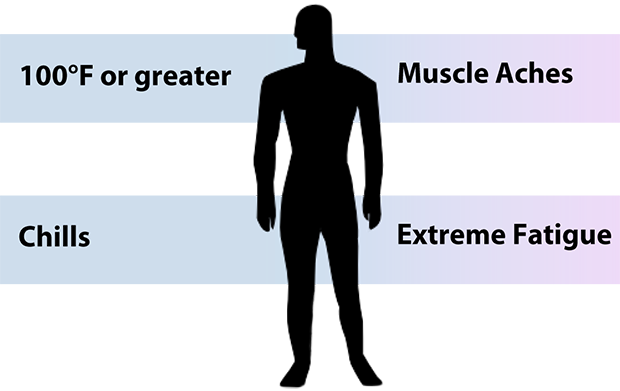Influenza, commonly known as the flu, is a serious respiratory disease. According to the Center for Disease Control and Prevention (CDC), each year, 200,000 Americans are hospitalized due to flu-related complications, with as many as 49,000 deaths from influenza-related causes.
Protect Yourself and Others
- If you’re not feeling well, please do not visit patients in the hospital.
- If you get sick, stay home from work and/or school and seek medical care from your primary care physician.
- Wash your hands often with soap and water, especially after you cough or sneeze. Alcohol-based hand cleaners also are effective.
- Cover your nose and mouth with a tissue when you cough or sneeze. Throw the tissue in the trash after you use it.
- Try to avoid close contact with sick people.
- Avoid touching your eyes, nose or mouth. Germs spread that way.
Flu Symptoms
What you thought was just a little cold could be the flu. Whenever you think you have the flu, talk to your doctor about treatment right away. Treating the flu virus at its source may help limit its ability to spread in your body.
- Fever* (100 degrees or greater): A fever occurs when your body temperature increases in response to illness or injury. Your temperature is considered elevated when it is 100 degrees or greater.
- Muscle aches: Body aches that are sudden and unexplained can be a sign of the flu.
- Chills: Body chills not related to a cold environment can be a sign of the flu.
- Extreme fatigue: Fatigue is a feeling of tiredness, exhaustion or lack of energy. When associated with one or more of the other symptoms, this can be a sign of the flu.
*It’s important to note that not everyone with flu will have a fever.

3 Recommendations to Help Fight the Flu
1. Take Time to Get Your Flu Shot
- The CDC recommends an annual flu shot as the first, and most important, step in protecting against seasonal influenza.
- While there are many different flu viruses, the seasonal flu vaccine protects against the three seasonal viruses that research suggests will be most common.
2. Take Everyday Preventive Actions
- Cover your nose and mouth with a tissue when you cough or sneeze. Throw the tissue in the trash after you use it.
- Wash your hands often with soap and water, especially after you cough or sneeze. Alcohol-based hand cleaners are also effective.
- Avoid touching your eyes, nose or mouth. Germs spread this way.
- Try to avoid close contact with sick people.
3. Take Flu Antiviral Drugs (if your doctor recommends them)
- If you have any questions, please contact your family member’s care team.
Who Should Get Flu Vaccinations?
The flu vaccine is recommended to all persons six months of age and older, including healthy adults. It is especially important to get a flu vaccine if you are:
- Six months through 18 years of age
- 50 years and older
- Pregnant or just had a baby
- At an unhealthy weight
- Living in a nursing home or long-term care home
- Living with a weakened immune system or chronic medical condition (diabetes, heart or lung disease)
- Living with or caring for someone who is more likely to have flu complications
- A person who works in health care
Where to Get a Flu Vaccination
You can always contact your physician’s office to get your flu shot. Below is a brief list of local resources where you and your family can get the flu vaccination.
- MemorialCare Medical Group, Urgent Care Center
- MemorialCare Outpatient Pharmacy, Long Beach Medical Center
- The Department of Health and Human Services
- A neighborhood pharmacy such as CVS, Walgreens, Vons, Rite Aid, and Target
Flu Season is Here - Do You Feel Sick?
Most people with the flu have mild illness and do not need medical care or anti-viral drugs. If you get sick with flu symptoms, in most cases, you should stay home and avoid contact with other people except to get medical care. If, however, you have symptoms of flu and are very sick or worried about your illness, contact your health care provider (doctor, physician's assistant, etc.).
Health care providers will determine whether influenza testing and possible treatment are needed. Your doctor may prescribe anti-viral drugs that can treat the flu. These drugs work better for treatment the sooner they are started.
Be Aware of the Flu F.A.C.T.S.
The most common symptoms include:
- Fever
- Aches
- Chills
- Tiredness
- Sudden onset
If you are experiencing flu symptoms, either:
- Call your doctor.
- Connect online with a doctor or nurse practitioner.
- Visit a local Urgent Care (see back for local Long Beach locations).
See a local Urgent Care today if you have flu symptoms and you belong to a group at risk of developing complications, such as:
- Pregnant women
- Children under two
- Adults over 65 years
- Those with a weakened immune system, chronic illness or obesity issues
- If you have a fever lasting more than 3 days
- If you have increased trouble breathing
Treatment within 24-48 hours may be very important. For more information contact the Centers for Disease Control and Prevention or your nearest Urgent Care facility.